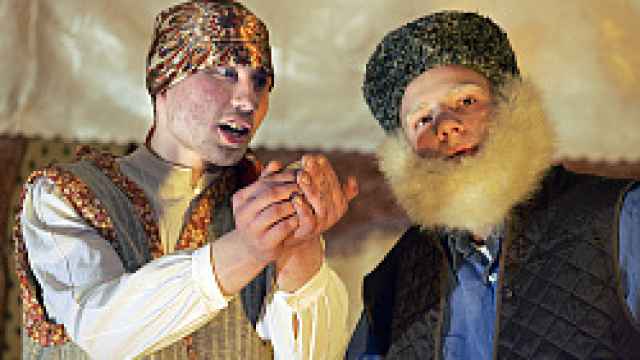His reaction was not so surprising, since Andrei is a prisoner at the Ikshanskaya juvenile prison colony, where most of the inmates are serving time for theft and robbery. The teenager's lifelike acting got approval from Spesivtsev, who visited the colony on Tuesday with a group of journalists to present his plan to teach the boys theater skills.
The 63-year-old director teaches at the State Institute of Theater Arts, or GITIS, and heads a youth theater named after him on Ulitsa Rustaveli. He arrived at the Moscow region colony with a group of actors to entertain the prisoners with a short play.
The boys in the colony already take drama lessons and put on plays. On Tuesday, they showed a short sketch based on a Russian fairy tale, for which the actors replaced their black uniforms with embroidered costumes and one boy dressed up as an old woman. That was for the visitors, a teacher said afterward, since the female teaching staff usually take those roles.
Spesivtsev wants the boys to learn theater skills such as acting, singing, lighting and sound. Currently, the prisoners spend half of each day working and learning practical skills -- making wheelbarrows and kitchenware, among other things -- while taking academic lessons in the afternoon, said Pavel Korovin, the head of the colony.
Korovin, a thin man who spoke quietly to his visitors but boomed in a parade-ground tone when addressing the boys, said the prisoners could leave the colony with professional qualifications in fields such as plumbing and welding.
Ikshanskaya, the oldest youth colony in Russia, was founded in 1902 as an idealistic reform establishment with no barbed wire or fences. Its grounds include a football pitch and a parade ground where the colony's timetable and rules are written out on large metal signs. The rules include a ban on getting tattoos or giving them to others.
The prisoners, who range in age from 14 to 18, all come from Moscow or the Moscow region. Most were convicted for theft, robbery or assault, although a few committed more serious crimes such as murder or rape.
So far, Spesivtsev's plans for training the prisoners remain fairly nebulous. In a talk before the show, he referred to Fyodor Dostoevsky, who spent years in prison, and said talents could be found in the colony as well. "Who knows, maybe there are talents among you," he said. "We will be coming regularly. We will be consulting the drama group. This is only the start of our meetings."
 Vladimir Filonov / MT Two boys from the colony act in a play based on a Russian fairy tale. | |
The prisoners' sketch was far more proper, involving an elderly peasant couple who find a golden egg. Two narrators to the side of the stage read out carefully learned lines.
At the end, Spesivtsev taught a brief class on method acting. "He is pretending to be an old man, he is pretending to be an old woman," he said of the lead actors. "But he needs to become an old man, he needs to become an old woman."
He asked the actors to behave as if a gold Christmas tree ornament were cheap rubbish -- prompting one boy to toss it to another without looking -- or as if it were a valuable diamond. A boy named Sasha, who had been one of the narrators in the prisoners' play but now seemed intimidated by the audience, said: "I can't act it. If it were really lying there, I could do it." When Spesivtsev asked him what he would do with a real diamond, he replied: "I'd sell it -- later."
 Vladimir Filonov / MT Boys at the colony watch a performance. | |
The boys often sleep during lessons, said the teacher, who has worked at the colony for 28 years. "They get tired during the day, and then they don't get enough sleep." She said that if a boy learns to make 20 rather than 60 mistakes in a written text, she feels she has done well.
Previous productions by the prison theater include Nikolai Gogol's "The Marriage" and Anton Chekhov's "The Cherry Orchard." Mostly, the prisoners play to a home audience, Grebennikova said, but once they performed a show outside the colony's walls, in a village hall, for the local residents. "They watched it with pleasure."
A Message from The Moscow Times:
Dear readers,
We are facing unprecedented challenges. Russia's Prosecutor General's Office has designated The Moscow Times as an "undesirable" organization, criminalizing our work and putting our staff at risk of prosecution. This follows our earlier unjust labeling as a "foreign agent."
These actions are direct attempts to silence independent journalism in Russia. The authorities claim our work "discredits the decisions of the Russian leadership." We see things differently: we strive to provide accurate, unbiased reporting on Russia.
We, the journalists of The Moscow Times, refuse to be silenced. But to continue our work, we need your help.
Your support, no matter how small, makes a world of difference. If you can, please support us monthly starting from just $2. It's quick to set up, and every contribution makes a significant impact.
By supporting The Moscow Times, you're defending open, independent journalism in the face of repression. Thank you for standing with us.
Remind me later.


